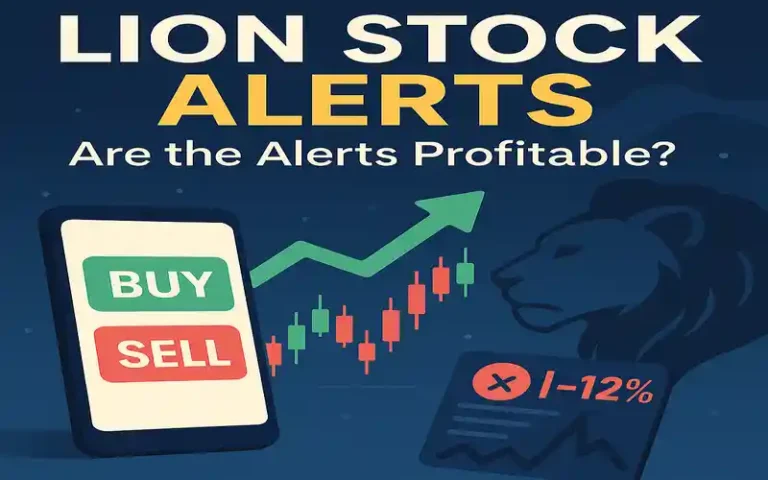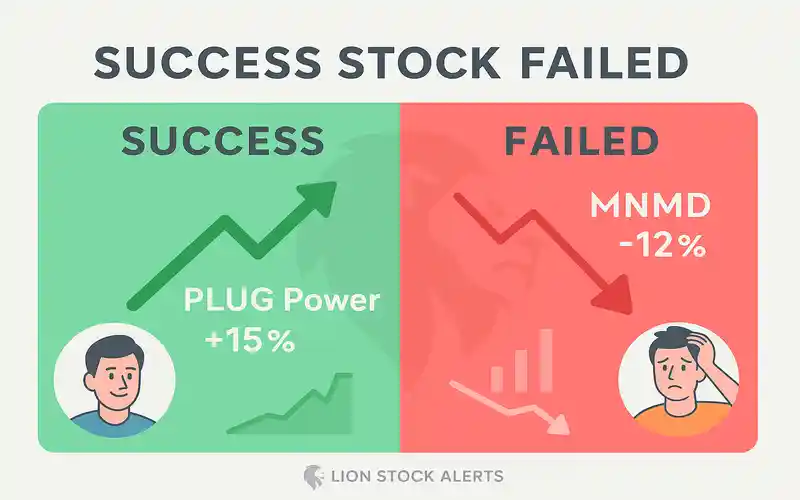
Lion Stock Alerts – Are the Alerts Profitable?
“Don’t blindly follow stock tips—follow strategy, discipline, and data.” — Linda Raschke
🦁 Summary: Are Lion Stock Alerts Worth the Hype?
This blog breaks down the accuracy and profitability of Lion Stock Alerts. You’ll discover how their system works, what real users report, expert insights, and whether their picks stand up over time. Includes data-backed analysis, pros/cons, and alternative tools.
📑 Table of Contents
- Introduction: What Are Lion Stock Alerts?
- How the Alerts Work
- Expert Opinions & Critiques
- Case Studies & Real Results
- Pros and Cons of Using Lion Alerts
- Key Takeaways
- FAQ: Lion Alerts
- Further Reading & Related Content
🧠 Introduction: What Are Lion Stock Alerts?
In the fast-paced world of stock trading, Lion Stock Alerts has built a reputation for sending high-conviction trade ideas to its members. But are these alerts truly profitable over time, or just cleverly marketed signals that underperform in real trading environments?
We’ll explore the inner workings of their alert system, success stories, and whether or not their picks align with smarter strategies like day vs swing trading styles, which may be better suited for consistency.
📲 How Do Lion Stock Alerts Work?
Lion Stock Alerts typically send buy or sell notifications via text or app, often based on technical indicators, volume spikes, or momentum setups. The service claims to help traders capitalize on early breakouts or trends—but timing and execution are crucial.
Some of their past alerts have included speculative penny stocks and options, which we explored in our own list of top penny stocks to buy now.
For context, many traders combine alerts like Lion’s with additional screening tools—see our coverage on swing trading setups that filter out false signals before entry.

💬 Expert Opinions & Critiques
Here’s what industry experts and trading educators are saying about services like Lion:
“Stock alerts can be useful, but only if you understand why the trade was chosen. Don’t treat them as plug-and-play signals.”
— Brian Shannon, CMT & Author of Technical Analysis Using Multiple Timeframes
“If you can’t replicate their logic on a chart, the alert is just noise.”
— Dan J. Ramer, Equity Strategy Coach
These insights align with a recurring theme: alerts are not magic. They work best when used alongside education, technical skill, and disciplined risk management.
📚 Case Studies & Real Results
Let’s break down two actual alert scenarios from Lion Stock Alerts—one that performed well and one that fell flat. These examples are for educational purposes and based on public user reports and tracking data.
✅ Case 1: Success with a Momentum Trade (PLUG Power)
An alert in early 2024 pointed out a volume spike in PLUG Power. The stock had just bounced off a support level and entered a short-term uptrend. Traders who entered around $7.10 and followed the suggested $8.20 target were able to lock in nearly 15% gains in 48 hours.
❌ Case 2: Loss with a Biotech Swing (MNMD)
Another alert recommended MNMD, citing potential FDA catalyst news. However, the news didn’t break as expected and the stock dropped 12% within a day. Despite a stop-loss recommendation, some users reported exiting late and experiencing heavier losses.
This shows why risk management tools like bull & bear spreads or disciplined entries from swing trading techniques are essential alongside alerts.

⚖️ Pros and Cons of Using Lion Alerts
Are Lion Alerts a helpful tool or a risky shortcut? Let’s break it down:
| ✅ Pros | ❌ Cons |
|---|---|
| ✔ Time-saving alerts sent in real-time | ✖ No guarantee of profitability |
| ✔ Good entry ideas for momentum or swing trades | ✖ Requires fast execution or you miss the move |
| ✔ Can complement technical analysis | ✖ High-risk picks like penny stocks or options |
| ✔ Community engagement and group trades | ✖ Alert overload can lead to poor filtering |
📌 Key Takeaways
- Lion Stock Alerts provide fast trade signals—but they work best when paired with your own research.
- Risk management is critical, especially with volatile alerts like biotech or low-float stocks.
- Use setups and tools such as Elliott Wave analysis to confirm alert strength.
- Not all alerts perform equally—track your results and learn from both wins and losses.
❓ FAQ: Lion Stock Alerts
Q1: Are Lion Stock Alerts beginner-friendly?
They can be—but only if the trader also understands basic chart patterns and stop-loss management. It’s not a plug-and-play system.
Q2: How accurate are their trade alerts?
Reported accuracy varies. Some alerts hit targets quickly, while others fail. Many traders filter the alerts using mentorship advice or a chat room community.
Q3: Do they alert options trades too?
Yes, though they’re higher risk. Always evaluate option alerts alongside your own technical criteria and use appropriate sizing.
Q4: Are these alerts legal or regulated?
Stock alerts are legal but unregulated. Use caution and avoid alerts that encourage pump-and-dump tactics. For safer investing, learn from our stock market investing guide.

📚 Further Reading & Related Content
- What Is Lion Stock Alerts?
- Shorting in Day Trading
- How $100 Became $1,000 – 3 Real Stock Stories
- Latest Trade of the Week Picks
🌐 Expert Resources on Stock Alerts
📘 What Are Stock Alert Services – Investopedia
Learn how alert services operate, their benefits and drawbacks, and how to vet them responsibly.
📊 Best Stock Alerts for Traders – Benzinga
Benzinga’s top-rated stock alert platforms and what makes them stand out in different trading styles.
📈 Are Stock Picking Services Worth It? – Motley Fool
The Motley Fool dives into alert-based investing and what makes one provider better than another.
📉 How to Pick Stocks with Discipline – CNBC
Alert services should never replace personal strategy. CNBC breaks down stock selection process.
🧠 The Problem with Financial Predictions – HBR
Alerts often rely on forecasting, which has its flaws. HBR explores where prediction breaks down.
📘 What Are Stock Alert Services? – Investopedia
A breakdown of alert-based services, how they work, and how to determine their legitimacy.
📊 Best Stock Alerts in 2025 – Benzinga
Ranking of the best stock alert systems available this year including real-time tools and AI signals.
📈 Are Stock Picking Services Worth It? – Motley Fool
Evaluates whether paid and free stock alerts actually benefit traders and long-term investors.
📉 How to Pick Stocks the Smart Way – CNBC
A practical guide on how to use alerts as part of a strategy—not as a substitute for it.
🧠 The Problem with Financial Predictions – HBR
Why most stock alerts fail over time and how psychological biases affect prediction accuracy.